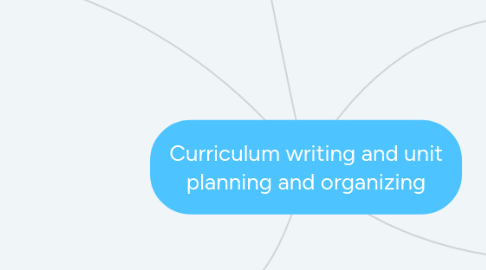Curriculum writing and unit planning and organizing
by Austin Claseman


1. Student-centered Curriculum Design
1.1. For your students to be engaged, they must be able to find the purpose for what you are about to teach them—beyond getting a good grade.
1.2. For learning to be meaningful, students must be able to utilize lived experiences to look for patterns in what they are learning while using their own models, concepts, and strate-gies of inquiry to answer relevant questions
1.3. Focus on depth versus breadth.
2. Student-centered Inquiry
2.1. Questions that affect their understanding of how they live in the world?
2.2. Your role as the teacher is to provide students means to conduct that investigation>
2.3. By conducting inquiry, students dig deeper into the subject, learning the content but also the process of learning along the way
3. Authentic Assessment
4. Essential Questions
4.1. The journey into a new topic should always begin with what they already know.
4.2. You are the expert on the topic, but you should be the expert at facilitating a culture of mutual discovery in which the student is empowered to learn.
4.3. Essential questions are questions that have the following characteristics • Open-ended, not answered through recall or with a single sentence • Thought provoking and able to spark discussion and debate • Requiring of analysis, inference, inquiry, prediction, etc. by learner • Inviting and intriguing so as to sustain student interest • Important and relevant to the student now (not for future needs or goals)
4.4. Essential questions should set the class off on an inquiry and learning journey instead of just requiring the repeating back previously delivered information.
4.5. KDU(Know, Do, Understand)
5. Thematic Scope and Sequence
5.1. Thematic curriculum planning requires that the learning is organized around a central conceptual theme with an essential question to explore.
5.1.1. The more pathways in and out of the brain, the more efficiently the brain can store and then access that information, thus reducing the need for strategies of rote memorization

